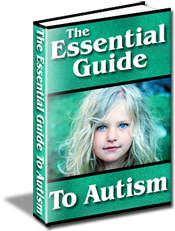How To Identify Autism In Your Child
Click Here To Know The Simple Methods To Effectively Spot The 31 Signs of Autism
Let's start at the beginning with discussing what is Autism?
Autism is a disorder of the brain and one in every two and a half thousand children are born with it. Children who are Autistic will show signs of being withdrawn from their environment and will have problems communicating. Often it is confused with Asperger's Syndrome and, although similar in many ways, they are two different diagnoses.
Signs of Autism can be displayed in a child as young as twelve months and it is usually prominent by the age of three. Autism is also called spectrum disorder or autistic spectrum disorder, and statistics show more males than females have been diagnosed with the neurological abnormality. Often, a child can seem very normal until up to three years of age, then suddenly they begin to change as their speech and social development is impaired. They will exhibit strange behavior and movements, have trouble communicating, some even become deaf and mute and will not like being held. Some will move compulsively and prefer to occupy themselves rather than play with toys or people. Every case is individual, so each child has a different combination of symptoms.
With communication being so difficult for those with spectrum disorder, it is common for their IQ to be below average. About a quarter of these cases excel in certain areas like math, art or music and their IQs are well above average. It is much harder to diagnose Autism in adults from any physical symptoms, but they have problems with understanding other's feelings, forming friendships, recognizing fear and behaving appropriately in social situations. Often, they will be self-destructive in their habits and are unable to understand the consequences of their actions.
Asperger's Syndrome is a mild form of Autism, with most of the symptoms being the same. Where Autism is clearly diagnosed by about age three, Asperger's onset is usually much later. Children with Asperger's will prefer isolation, exhibit eccentricities, will have strange inflections in their way of speaking, can be uncoordinated and clumsy and single minded in their interests.
High functioning autism is where a person has been diagnosed with the disorder but is still able to continue with a relatively unaffected life. Asperger's disorder is considered milder than this type of Autism, so they can usually maintain a fairly uninterrupted existence. Someone with Asperger's may not be viewed any differently in society, but with Autism, they will be noticeably unique in their movements and speech and can have more trouble learning. This means they can experience more difficulty fitting in and possibly even discrimination.
There is no cure for Autism or Asperger's and no way to return their normal functions and abilities. However, much progress is always being made in ways to manage the disorders. Speech therapy, special diets, music therapy, sensory integration, art therapy, behavior modification and auditory training are all ways to assist in handling Autism so they can lead a life as close to normal as is possible. Since it is specific to the individual, treatments are tailored to each case. Some may need drug therapy for hyperactivity disorders or anger control.
Having a child with Autism can be very stressful and taxing on the family, so strategies for coping will be needed for all who are involved. Autistic children need extra attention and endless supplies of love and understanding. They never truly mature like most of us, but they will have a better chance of being independent if they receive the required training and support therapies.
Jon is a computer engineer who maintains many websites to pass along his knowledge, experience, information, and findings. You can read more about Autism, Autistic Spectrum Disorder, and Asbergers Syndrome at his web site at http://www.autism-explained.com/
Labels: autism_edition_expanded_in_life_picture_thinking, autism_knew_student_ten_things_wish, autism_speaks, autism_type

